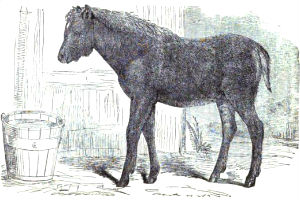About an Alleged Deer-horse Hybrid
(Hollick 1880)
EUGENE M. MCCARTHY, PHD GENETICS
|
|

The following is a transcript of a passage in Frederick Hollick's The Origin of Life (1880, p. 475), accompanied by the illustration at right, which originally appeared in the Dec. 9, 1848 issue of the Illustrated London News. Frederick Hollick (1818-1900) was a 19th-century American physician and author. The passage itself seems to be largely based on the London News original. It reads as follows: “A few years ago a remarkable hybrid was found in the New Forest, in the South of England, of which we give an illustration. The account given
of it states that “this remarkable filly (seven months old) was found a short time since in the New Forest, and is evidently of a mixed breed, between the horse and the deer. Her mother (a pony mare) was observed to associate with some red deer stags in the New Forest for some months, and, at last, this foal was seen by her side. The nose shows a proximity both to the stag and horse; her forehead is round, like that of the deer; legs slender and distinctly double; hoofs pointed, and partly double; color brown, lighter under the belly, and tail like a deer.
This extraordinary animal is the property of T. G. Attwater, Esq., of Attwater, at the village of Bodenham, three miles from Salisbury. Dr. Fowler, of that city, has inspected the hybrid, and is quite satisfied of the correctness of the preceding statement; and Colonel Buckley (a keeper of the New Forest) has likewise seen the animal, and is of a similar opinion.
This is one of the most remarkable and best-attested instances of hybridization, between animals very remote from each other, that I have ever met with, and proves that with due care, crosses may be effected to a greater extent than is usually supposed possible.
By the same author: Handbook of Avian Hybrids of the World, Oxford University Press (2006).
Most shared on Macroevolution.net:
Human Origins: Are we hybrids?
On the Origins of New Forms of Life
Mammalian Hybrids
Cat-rabbit Hybrids: Fact or fiction?
Famous Biologists
Dog-cow Hybrids
Prothero: A Rebuttal
Branches of Biology
Dog-fox Hybrids
Original Latin of passage quoted above: “In Gallia vero equa a cervo subacta, pullum peperit, posteriori parte сervae similem, quem nullus alius equus cursu aequare potuit ipsum Ludovicus rex a possessore dono accepit.” From Ruf, J. De Conceptu et Generatione Hominis, Tiguri, 1587, p. 48).